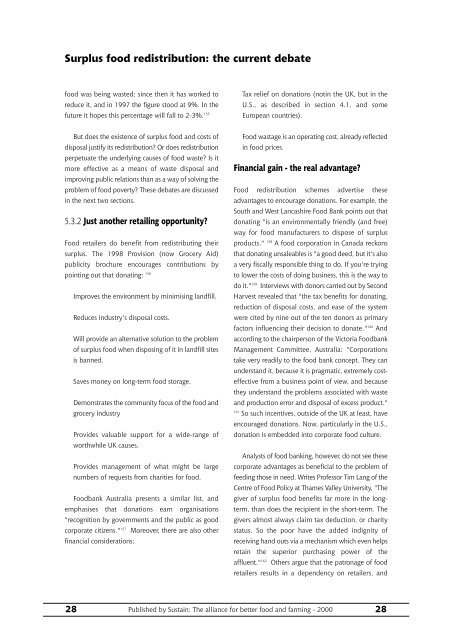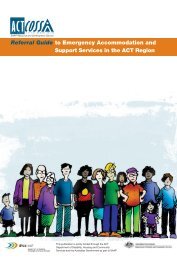Too much and too little? Debates on surplus food redistribution
Too much and too little? Debates on surplus food redistribution
Too much and too little? Debates on surplus food redistribution
Create successful ePaper yourself
Turn your PDF publications into a flip-book with our unique Google optimized e-Paper software.
Surplus <strong>food</strong> redistributi<strong>on</strong>: the current debate<br />
<strong>food</strong> was being wasted; since then it has worked to<br />
reduce it, <str<strong>on</strong>g>and</str<strong>on</strong>g> in 1997 the figure s<str<strong>on</strong>g>too</str<strong>on</strong>g>d at 9%. In the<br />
future it hopes this percentage will fall to 2-3%. 155<br />
But does the existence of <strong>surplus</strong> <strong>food</strong> <str<strong>on</strong>g>and</str<strong>on</strong>g> costs of<br />
disposal justify its redistributi<strong>on</strong>? Or does redistributi<strong>on</strong><br />
perpetuate the underlying causes of <strong>food</strong> waste? Is it<br />
more effective as a means of waste disposal <str<strong>on</strong>g>and</str<strong>on</strong>g><br />
improving public relati<strong>on</strong>s than as a way of solving the<br />
problem of <strong>food</strong> poverty? These debates are discussed<br />
in the next two secti<strong>on</strong>s.<br />
5.3.2 Just another retailing opportunity?<br />
Food retailers do benefit from redistributing their<br />
<strong>surplus</strong>. The 1998 Provisi<strong>on</strong> (now Grocery Aid)<br />
publicity brochure encourages c<strong>on</strong>tributi<strong>on</strong>s by<br />
pointing out that d<strong>on</strong>ating: 156<br />
l Improves the envir<strong>on</strong>ment by minimising l<str<strong>on</strong>g>and</str<strong>on</strong>g>fill.<br />
l Reduces industry's disposal costs.<br />
l Will provide an alternative soluti<strong>on</strong> to the problem<br />
of <strong>surplus</strong> <strong>food</strong> when disposing of it in l<str<strong>on</strong>g>and</str<strong>on</strong>g>fill sites<br />
is banned.<br />
l Saves m<strong>on</strong>ey <strong>on</strong> l<strong>on</strong>g-term <strong>food</strong> storage.<br />
l Dem<strong>on</strong>strates the community focus of the <strong>food</strong> <str<strong>on</strong>g>and</str<strong>on</strong>g><br />
grocery industry<br />
l Provides valuable support for a wide-range of<br />
worthwhile UK causes.<br />
l Provides management of what might be large<br />
numbers of requests from charities for <strong>food</strong>.<br />
Foodbank Australia presents a similar list, <str<strong>on</strong>g>and</str<strong>on</strong>g><br />
emphasises that d<strong>on</strong>ati<strong>on</strong>s earn organisati<strong>on</strong>s<br />
"recogniti<strong>on</strong> by governments <str<strong>on</strong>g>and</str<strong>on</strong>g> the public as good<br />
corporate citizens." 157 Moreover, there are also other<br />
financial c<strong>on</strong>siderati<strong>on</strong>s:<br />
l Tax relief <strong>on</strong> d<strong>on</strong>ati<strong>on</strong>s (notin the UK, but in the<br />
U.S., as described in secti<strong>on</strong> 4.1, <str<strong>on</strong>g>and</str<strong>on</strong>g> some<br />
European countries).<br />
l Food wastage is an operating cost, already reflected<br />
in <strong>food</strong> prices.<br />
Financial gain - the real advantage?<br />
Food redistributi<strong>on</strong> schemes advertise these<br />
advantages to encourage d<strong>on</strong>ati<strong>on</strong>s. For example, the<br />
South <str<strong>on</strong>g>and</str<strong>on</strong>g> West Lancashire Food Bank points out that<br />
d<strong>on</strong>ating "is an envir<strong>on</strong>mentally friendly (<str<strong>on</strong>g>and</str<strong>on</strong>g> free)<br />
way for <strong>food</strong> manufacturers to dispose of <strong>surplus</strong><br />
products." 158 A <strong>food</strong> corporati<strong>on</strong> in Canada reck<strong>on</strong>s<br />
that d<strong>on</strong>ating unsaleables is "a good deed, but it's also<br />
a very fiscally resp<strong>on</strong>sible thing to do. If you're trying<br />
to lower the costs of doing business, this is the way to<br />
do it." 159 Interviews with d<strong>on</strong>ors carried out by Sec<strong>on</strong>d<br />
Harvest revealed that "the tax benefits for d<strong>on</strong>ating,<br />
reducti<strong>on</strong> of disposal costs, <str<strong>on</strong>g>and</str<strong>on</strong>g> ease of the system<br />
were cited by nine out of the ten d<strong>on</strong>ors as primary<br />
factors influencing their decisi<strong>on</strong> to d<strong>on</strong>ate." 160 And<br />
according to the chairpers<strong>on</strong> of the Victoria Foodbank<br />
Management Committee, Australia: "Corporati<strong>on</strong>s<br />
take very readily to the <strong>food</strong> bank c<strong>on</strong>cept. They can<br />
underst<str<strong>on</strong>g>and</str<strong>on</strong>g> it, because it is pragmatic, extremely costeffective<br />
from a business point of view, <str<strong>on</strong>g>and</str<strong>on</strong>g> because<br />
they underst<str<strong>on</strong>g>and</str<strong>on</strong>g> the problems associated with waste<br />
<str<strong>on</strong>g>and</str<strong>on</strong>g> producti<strong>on</strong> error <str<strong>on</strong>g>and</str<strong>on</strong>g> disposal of excess product."<br />
161 So such incentives, outside of the UK at least, have<br />
encouraged d<strong>on</strong>ati<strong>on</strong>s. Now, particularly in the U.S.,<br />
d<strong>on</strong>ati<strong>on</strong> is embedded into corporate <strong>food</strong> culture.<br />
Analysts of <strong>food</strong> banking, however, do not see these<br />
corporate advantages as beneficial to the problem of<br />
feeding those in need. Writes Professor Tim Lang of the<br />
Centre of Food Policy at Thames Valley University, "The<br />
giver of <strong>surplus</strong> <strong>food</strong> benefits far more in the l<strong>on</strong>gterm,<br />
than does the recipient in the short-term. The<br />
givers almost always claim tax deducti<strong>on</strong>, or charity<br />
status. So the poor have the added indignity of<br />
receiving h<str<strong>on</strong>g>and</str<strong>on</strong>g> outs via a mechanism which even helps<br />
retain the superior purchasing power of the<br />
affluent." 162 Others argue that the patr<strong>on</strong>age of <strong>food</strong><br />
retailers results in a dependency <strong>on</strong> retailers, <str<strong>on</strong>g>and</str<strong>on</strong>g><br />
28 Published by Sustain: The alliance for better <strong>food</strong> <str<strong>on</strong>g>and</str<strong>on</strong>g> farming - 2000 28













